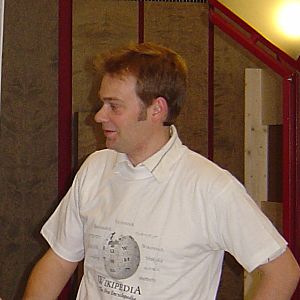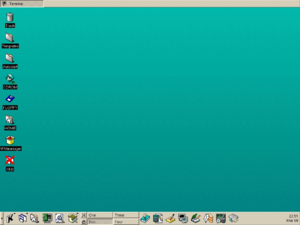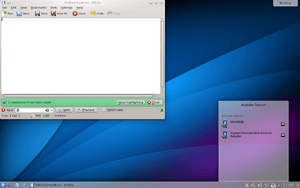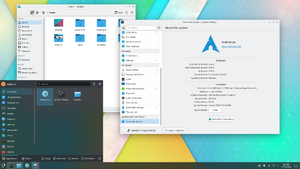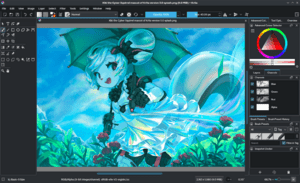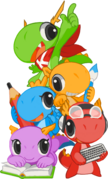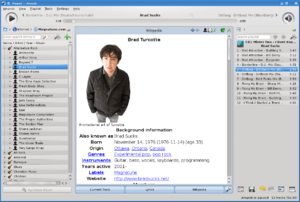KDE facts for kids
 |
|
| Founded | 14 October 1996 |
|---|---|
| Founder | Matthias Ettrich |
| Type | Community |
| Focus | Free software |
| Products | KDE Plasma, KDE Frameworks, KDE Applications, Calligra Suite, Krita, KDevelop, digiKam, Amarok, Kirigami, and many more |
| Method | Artwork, development, documentation, promotion, and translation. |
KDE is a big group of people from all over the world who create free and open-source software. This means the software can be used, changed, and shared by anyone. KDE provides tools and help for people to work together on its projects.
KDE makes many different things. These include KDE Plasma, which is how your computer screen looks and works. They also make KDE Frameworks and a lot of apps like Kate (a text editor), digiKam (for photos), and Krita (for drawing). Many KDE apps can run on different types of computers, like Unix systems, Microsoft Windows, and Android phones. A group in Germany called KDE e.V. handles the legal and money parts for KDE.
Contents
How KDE Started
KDE was started in 1996 by Matthias Ettrich. He was a student at the University of Tübingen in Germany. Matthias noticed that computer programs on Unix systems didn't look or act the same. He also thought they were too hard for regular people to use.
To fix this, he suggested making a new computer environment. In this environment, all programs would look and work in a similar, easy way. He shared his idea online, and many people became interested. That's how the KDE project began!
The name KDE was a playful nod to another computer environment called Common Desktop Environment (CDE). CDE was made for Unix systems too. The K in KDE was first thought to mean "Kool," but then it was decided that K didn't stand for anything special. For a while, KDE meant "K Desktop Environment." But in 2009, the name was changed to just KDE. Now, it means the whole community that creates the software.
At first, Matthias Ettrich chose to use a special tool called Qt from a company called Trolltech for KDE. Other programmers quickly started making KDE apps using Qt. By early 1997, some apps were ready. The first full version of KDE, called KDE 1.0, came out on July 12, 1998.
Later, in 2009, KDE changed how it organized its projects. Instead of just one big "KDE" project, it split into three main parts:
- KDE Plasma: This is the desktop environment itself. It's how your computer screen looks and how you use it.
- KDE Frameworks: These are like building blocks or tools that programmers use to create KDE applications.
- KDE Gear: This is the collection of many useful applications, like Kdenlive (for video editing) or Krita (for drawing).
Since 2009, the name KDE refers to the community of people who make all this software.
Software Releases Over Time
| Version | Date | What Happened |
|---|---|---|
| 14 October 1996 | KDE project was announced | |
| K Desktop Environment 1 | 12 July 1998 | First official release |
| K Desktop Environment 2 | 23 October 2000 | |
| K Desktop Environment 3 | 3 April 2002 | |
| KDE Software Compilation 4 | 11 January 2008 | |
| KDE Plasma 5 | 15 July 2014 | KDE split into Plasma, Frameworks, and Applications |
| KDE Plasma 6 | 28 February 2024 | Latest major public release |
What KDE Creates
The KDE community works on many free software projects. As mentioned, the main parts are:
- KDE Plasma: This is your computer's desktop. It has customizable layouts, panels, and supports virtual desktops and widgets. It's built using Qt and KDE Frameworks.
- KDE Frameworks: These are like special toolkits and libraries. They help developers build KDE applications more easily.
- KDE Gear: This is a collection of many useful applications. Examples include Kdenlive (for video editing) and Krita (for digital painting). Most of these apps are built using KDE Frameworks.
Other Cool Projects
KDE neon
KDE neon is a special software collection. It uses Ubuntu LTS as its base. Its goal is to give users the newest Qt and KDE software very quickly. Other parts of the operating system update at a normal speed from Ubuntu. KDE says it's not a full "KDE operating system," but rather a way to get the latest KDE and Qt programs.
Subtitle Composer
Subtitle Composer is a free and open-source program. It helps you create and edit subtitles for videos. It works on Linux and Microsoft Windows computers. This project joined KDE in December 2019. It can handle many subtitle types, show video previews, and even help with speech recognition.
WikiToLearn
WikiToLearn, or WTL, is a newer project from KDE. It's a wiki, like Wikipedia, but it's for creating and sharing open-source textbooks. The idea is to build a huge library of textbooks that anyone can use and help create. It started with physics students at the University of Milan who wanted to share notes. Now, it's an official KDE project with support from several universities.
Who Helps KDE
Most of the work on KDE software is done by volunteers. However, some companies, like Novell or Blue Systems, hire developers to work on KDE projects. Many people help KDE in different ways, like writing code, translating text, creating artwork, or writing documents.
The KDE community talks to each other in many ways. They use mailing lists, chat rooms (IRC), blogs, and online forums. They also have a Code of Conduct to make sure everyone acts respectfully.
How Development Works
The KDE community uses a system called Git to manage their code. They have a special website called Invent where you can see all the projects. They also use a tool called Phabricator to keep track of tasks.
In 2009, KDE announced that they had reached one million "commits" to their code. A commit is like saving a change to the project. Experts estimated that it would cost a lot of money (over $175 million) to develop the main KDE software if it were done by a company. This shows how much work volunteers put in!
The Core Team
The overall direction for KDE is set by the KDE Core Team. These are developers who have helped KDE a lot for a long time. They talk on a special mailing list. KDE doesn't have one single leader who makes all the decisions. Instead, the core team, made up of many contributors, makes decisions by discussing things together.
Developers also work in smaller teams based on what they do. For example, the KDE Edu team creates free educational software. These teams often work on their own projects and have their own ways of communicating.
KDE Patrons
A KDE Patron is a person or company that supports the KDE community by donating money to KDE e.V.. As of February 2024, there are nine such patrons, including companies like Google and SUSE.
KDE Community Structure
Mascots
The KDE community's mascot is a green dragon named Konqi. Konqi's look was updated when Plasma 5 came out. The new design was chosen from a competition.
Katie is a female dragon. She was introduced in 2010 and is the mascot for the KDE women's community. Other dragons with different colors and jobs were added to Konqi's group as part of the new design. Each dragon has special antlers that show what they do in the KDE community.
Kandalf the wizard was the old mascot for KDE during its early versions. He looked a bit like the character Gandalf. Some people thought the mascot was changed to Konqi because of copyright worries, but KDE has never said this for sure.
KDE e.V. Organization
The money and legal matters for KDE are handled by KDE e.V.. This is a non-profit group in Germany. It owns the KDE name and logo. It also takes donations, helps run the computer servers, and helps organize meetings and conferences. However, it doesn't tell developers what software to create.
Local Communities
KDE has local groups in many countries. These can be informal groups (like KDE India) or official legal groups (like KDE France). These local groups run websites for their regions and organize local events. These events include trade shows, meetings for contributors, and social gatherings.
KDE's Look and Feel
KDE has guidelines for how its community should look and feel. This helps create a unique and appealing design. The official KDE logo shows a white K-Gear shape on a blue square.
Many KDE applications have a K in their name, often as the first letter. Sometimes, the K replaces a "C" or "Q" sound, like in Konsole (console) or Kaffeine (caffeine). Other times, a common word just gets a K added to the front, like KGet. However, the newer trend is to not have a K in the name at all, like with Spectacle, Discover, and Dolphin.
Working with Others
Wikimedia
In 2005, KDE and the Wikimedia Foundation (the group behind Wikipedia) started working together. Because of this, you can now see MediaWiki syntax highlighted in the Kate text editor. Also, KDE apps like Amarok (a music player) and Marble (a virtual globe) can show content from Wikipedia.
In 2008, KDE e.V. and Wikimedia Deutschland even opened shared offices in Germany.
Free Software Foundation Europe
In 2006, KDE e.V. became a member of the Free Software Foundation Europe (FSFE). In 2008, KDE e.V. and FSFE announced that KDE would use FSFE's Fiduciary Licence Agreement. This lets KDE developers give their copyrights to KDE e.V. if they want to. In 2009, KDE e.V. and FSFE moved into shared offices in Berlin.
Companies That Help
Several companies actively help KDE. These include Collabora, Blue Systems, and The Qt Company.
Nokia used parts of Calligra Suite for their "Office Viewer" app on their Maemo/MeeGo phones. They also hired a company to help Calligra work with Microsoft Office files. Nokia also directly hired some KDE developers.
Other Collaborations
KDE works with freedesktop.org. This group tries to make different Unix desktop environments work better together.
In 2009 and 2011, KDE and GNOME (another desktop environment) held their main conferences together. They called it the "Desktop Summit."
Many Linux operating systems and other free operating systems help develop and share KDE software. This includes companies like SUSE and Red Hat. It also includes government-funded groups like the Scientific and Technological Research Council of Turkey, which makes a Linux system called Pardus.
In 2018, Red Hat said that KDE Plasma would no longer be directly supported in future updates of Red Hat Enterprise Linux. However, Fedora (another Linux system) still offers KDE Plasma. Fedora also makes KDE Plasma available to Red Hat Enterprise Linux users through a special project.
KDE Activities
KDE has two main conferences: Akademy and Camp KDE. There are also smaller local events.
Akademy
Akademy is KDE's big yearly meeting. It happens every summer in different places in Europe. The main goals of Akademy are to bring the community together, share what they've achieved, and work with partners. It also helps involve local people and gives developers a place to code together. KDE e.V. helps with planning and organizing.
The first KDE conference was called KDE One in Germany in 1997. It was to talk about the first KDE release. Since 2003, the conferences have been held once a year. They started being called Akademy in 2004.
At the yearly Akademy conference, they give out Akademy Awards. These awards recognize people who have made great contributions to KDE. There are awards for the best application, best non-application, and a special jury's award.
Camp KDE
| Year | Venue | Date |
|---|---|---|
| 2009 | Negril, Jamaica | 17–18 January |
| 2010 | La Jolla, US | 15–22 January |
| 2011 | San Francisco, US | 4–5 April |
Camp KDE is another yearly conference for KDE contributors. This event gives people in North America a chance to meet and share their experiences. It's free for everyone who attends. It helps make sure KDE is seen as a worldwide community, not just focused on Europe. KDE e.V. helps with travel and lodging for speakers and organizers.
The first Camp KDE was in 2009 in Jamaica. It included presentations, meetings, and coding sessions. Camp KDE 2010 was at the University of California, San Diego in the US. Camp KDE 2011 was in San Francisco, US, held with another big Linux event.
SoK (Season of KDE)
Season of KDE is a program where students can work on KDE projects. They get mentors from the KDE community who help them complete their projects.
Other Community Events
| conf.KDE.in | ||
|---|---|---|
| Year | Venue | Date |
| 2011 | Bangalore | 9–13 March |
conf.kde.in was the first KDE and Qt conference in India. It was held in Bangalore in 2011. The first few days had talks and workshops, and the last two days were for focused coding. Over 300 people attended the opening talks.
| Día KDE | ||
|---|---|---|
| Year | Venue | Date |
| 2011 | Rosario | 27 August |
Día KDE (KDE Day) is an event in Argentina focused on KDE. It has talks and workshops. The goals are to share free software, strengthen the local KDE group, and bring the community together for fun. It's a free event.
A Release party is a party that celebrates when a new version of KDE software comes out. KDE also takes part in other conferences about free software.
Where KDE is Used
KDE software is used in many places around the world:
- Brazil: The primary school system in Brazil uses computers with KDE software. This means over 42,000 schools and nearly 52 million children use it. The main system is called Educational Linux, based on Kubuntu. Thousands more students in Brazil use KDE products in their universities.
- Portugal and Venezuela: KDE software is also used in schools in Portugal (700,000 systems) and Venezuela (one million systems).
- Turkey: Many parts of the Turkish government use KDE software through Pardus, a local Linux system. This includes the Turkish Armed Forces and the Ministry of Foreign Affairs.
- CERN: The European Organization for Nuclear Research, CERN, uses KDE software.
- Germany: Germany uses KDE software in its embassies around the world, on about 11,000 computer systems.
- NASA: NASA used the Plasma Desktop during the Mars Mission.
- Steam Deck: Valve Corporation's handheld gaming computer, the Steam Deck, uses the KDE Plasma desktop when you switch it to desktop mode.
See also
 In Spanish: KDE para niños
In Spanish: KDE para niños
- KDE Projects
- List of KDE applications
- Free software community
- Trinity Desktop Environment
- GNOME
 | Selma Burke |
 | Pauline Powell Burns |
 | Frederick J. Brown |
 | Robert Blackburn |


